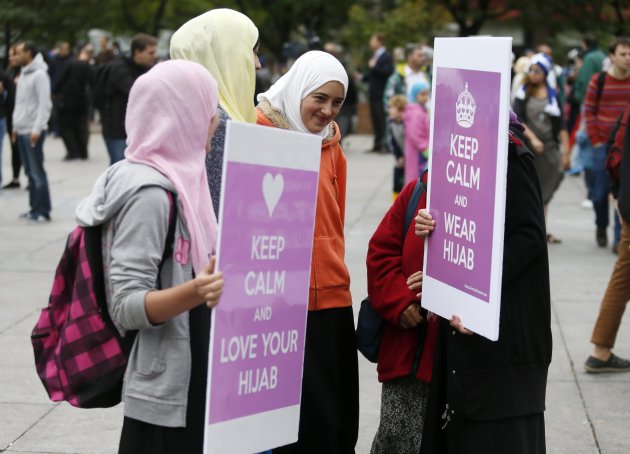
 Print
Muslim groups split on Jason Kenney's no-veil policy for citizenship oaths
10-21-2014
There’s yet another debate taking place in Canada about niqabs, face coverings and religious accommodation.
This one, however, is not focused on Quebec; it’s happening in an Ontario court. And no, it’s not the result of a separatist government. It’s all thanks to multicultural minister, Conservative Party ethnic outreach king and former immigration minister Jason Kenney.
Back in 2011, Kenney and his government amended regulations to place a ban on face coverings — such as niqabs — for anyone taking an oath of citizenship in front of a citizenship judge.
That change is now being deliberated over by a court.
As explained by the Toronto Star, Mississauga resident Zunera Ishaq is challenging the government’s edict on grounds that it violates Canada’s Charter of Rights and Freedoms.
"This policy was dictated by the immigration minister [Jason Kenney] that there had to be a change, and there’s no willingness to provide any accommodation,” Lorne Waldman, Ishaq’s co-counsel said, according to the Star.
“The applicant has the right to be accommodated. It’s her right to take the oath without taking off the niqab.”
On Friday, Kenney took to Twitter to reassert his position.
The move is somewhat out of step for Kenney who usually goes out of his way to accept and celebrate Canada’s cultural differences.
 Minister of Employment and Social Development Jason Kenney speaks in Ottawa on Oct. 2, 2014. (CP) Minister of Employment and Social Development Jason Kenney speaks in Ottawa on Oct. 2, 2014. (CP)
But in the case of niqabs — there’s no unified position on the issue within the Muslim community.
According to the National Post, the Muslim Canadian Congress lauded Kenney, in 2011, calling it a “courageous decision.”
"The niqab or burka is a political tool by Islamists who wish to segregate Muslims into religious ghettos, cut off from mainstream society," Farzana Hassan of the Muslim Canadian Congress said in 2011, according to thePost.
"Islamists consider women who do not cover their heads and faces, which constitutes the vast majority, as sinners and lesser Muslims.”
But other groups are confused by Kenney’s position on this.
"It is not up to us or anyone else to tell other women how they must dress themselves. This is left up to the decision of the individual woman to decide, in this case Zunera Ishaq," Sahar Zaidi of the Canadian Council of Muslim Women told Yahoo Canada News.
"If the Harper government spoke against Quebec’s Values Charter, then it seems odd to deny a woman who believes she is wearing an article of faith from participating in a citizenship ceremony."
Zaidi’s organization released the results of survey earlier this year which they say dispels longstanding myths about the niqab.
"A majority of the women who participated said they began wearing the veil after turning 18, and most foreign-born respondents said they only began wearing the niqab after arriving in Canada," noted a press release accompanying the report.
"The study indicates most women who wear the niqab made the decision based on a personal belief, rather than pressure from spouses or relatives."
 Protest against Quebec's move to ban the wearing of religious garb by gov't employees. (Reuters) Protest against Quebec's move to ban the wearing of religious garb by gov't employees. (Reuters)
Muslim Council of Montreal leader Salam Elmenyawi, who was one of the key figures in the fight against Quebec Values Charter, says he admires Ishaq’s courage and conviction.
"The only places where there are dress codes like this…are in the dictatorships. Not in Canada, Canada is the place that gives freedom of expression," he told Yahoo Canada News suggesting that Kenney has political reasons for pushing for the change.
"To suggest that this woman is disloyal to Canada because she’s not [seen] to be moving her lips is really starting [on] the wrong foot.
"This is not a question of only religion. It’s a question of modesty and the way they’ve grown up in life. [Some of these women] are not [comfortable] showing their face to strangers. Only to their family, their spouses. So why would you put them in an uncomfortable situation when they are celebrating becoming Canadian? Why?"
Elmenyawi believes that Ishaq will ultimately win her battle in the courts.
The judge has reserved judgement.
Footnotes:
|